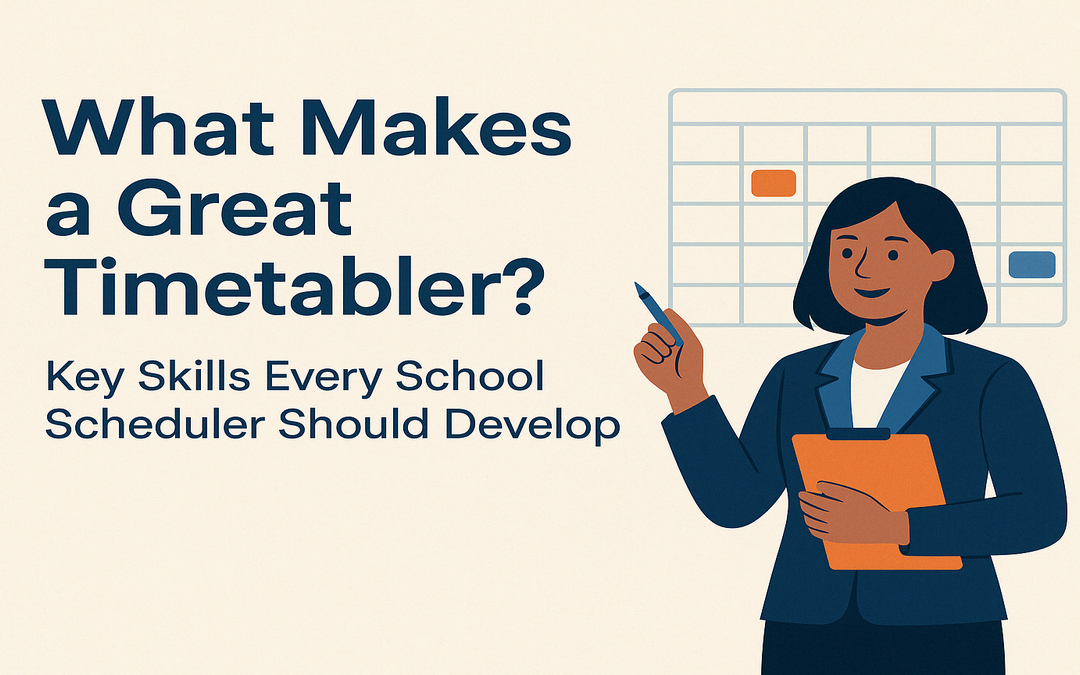As timetabling season hits its peak, the pressure to get everything in place can be intense. But the difference between a passable timetable and a powerful one isn’t just about filling slots—it’s about vision.
Any thoughts or comments are welcome – just email mist@mistservices.co.uk
Many schools are returning from an Easter break, the timetabling season is going up a gear and it made me think of the new timetablers this year! At MIST Services we run a Principles of Timetabling course and at times delegates arrive and seem quiet or nervous. A couple of questions we ask at the start of the course are:
1 – What excites you about being the school timetabler.
2 – Do you have any reservations about being the school timetabler!
Amongst the answers to question two we often get replies along the lines of line:
- I’m taking over from a timetabler who has 10+ years of experience
- I’m not a mathematical genius nor a physicist!
Our reply is typically ‘so-what’. Although this may sound harsh, someone who timetabled for the same school for 10 years – knows that timetable really well and honed their skills so they are pretty efficient at knowing what will or won’t work. As a new timetabler your first timetable will typically be your hardest as you ‘don’t know what you don’t know’, but it doesn’t mean you can’t complete a timetable! As for being a mathematician or physicist, I would say it’s handy to be able to add up some numbers but other than that there isn’t a lot of maths required. At MIST Services we train in the region of 200+ timetablers a year and some of the best timetablers we meet are musicians or Geographers.
What is important to understand is that behind every smoothly running school is a timetabler who knows how to weave together hundreds of moving parts into a single, functioning whole. Yet, despite its complexity and impact, timetabling is often an overlooked skill by some schools or individuals. So, what exactly sets apart a great timetabler from a merely competent one?
The Skills That Make the Difference
Attention to detail – A single clash or oversight can ripple across departments. Great timetablers have a sharp eye for spotting inconsistencies, duplications, or scheduling errors before they cause trouble. It’s better to be able to pre-empt impossibilities/compromises early so that conversations can be had with colleagues early. Rather than presenting them with a timetable that is fait-au-complete.
Patience and persistence – Timetabling is an extremely large puzzle/jigsaw with dozens of constraints. Often the constraints may contradict each other! You’ll hit dead ends. You’ll have to rethink entire blocks and/or staffing. The best timetablers expect this—and don’t give up until it works.
Strong communication – Great timetablers know how to ask the right questions, listen carefully, and communicate clearly with senior leaders, heads of department, admin staff, and teachers. They turn needs and expectations into workable solutions. Their answer should never be a straight ‘no’!
Problem-solving mindset – Whether it’s fitting a part-time teacher into an overloaded year group or reshuffling rooms to accommodate a new subject, effective timetablers thrive on finding solutions where others see roadblocks.
Software awareness/competence – There are many timetabling tools/software that can potentially automate some/all the timetabling process—but only if the user knows how to the software effectively. The best timetablers are comfortable with their software and aren’t afraid to explore its more advanced features. They see software as part of their toolkit, that can help them/reduce the time it takes, but working in tandem with the software solution rather than expect the software to do the timetablers’ job on their behalf.
How to Grow as a Timetabler
If you’re looking to build your own skills, start here:
- Practice analysing old timetables for strengths and weaknesses. Is there anything that could be done to turn ‘weaknesses’ into ‘strengths’ without impacting any current strengths!
- Analyse your current timetable from different viewpoints for strengths/weaknesses as:
- A student/parent
- A main scale teacher
- A part-time teacher
- A head of department
- Get familiar with your timetabling software including advanced features, so it isn’t just being used as an electronic pegboard.
- Shadow experienced schedulers or make notes of what you are doing and why during the creation of your timetable.
- Work on your ability to explain complex scheduling decisions in simple, relatable terms.
Final Thought
Timetabling is more than admin—it’s a form of leadership. When done well, it supports staff wellbeing, boosts student performance, and makes everything else in school life run more smoothly. So if you’re a timetabler—or want to become one—know that your role is not only vital, but valued.
Any questions please just ask or more information about the services we offer please click your software solution below.





